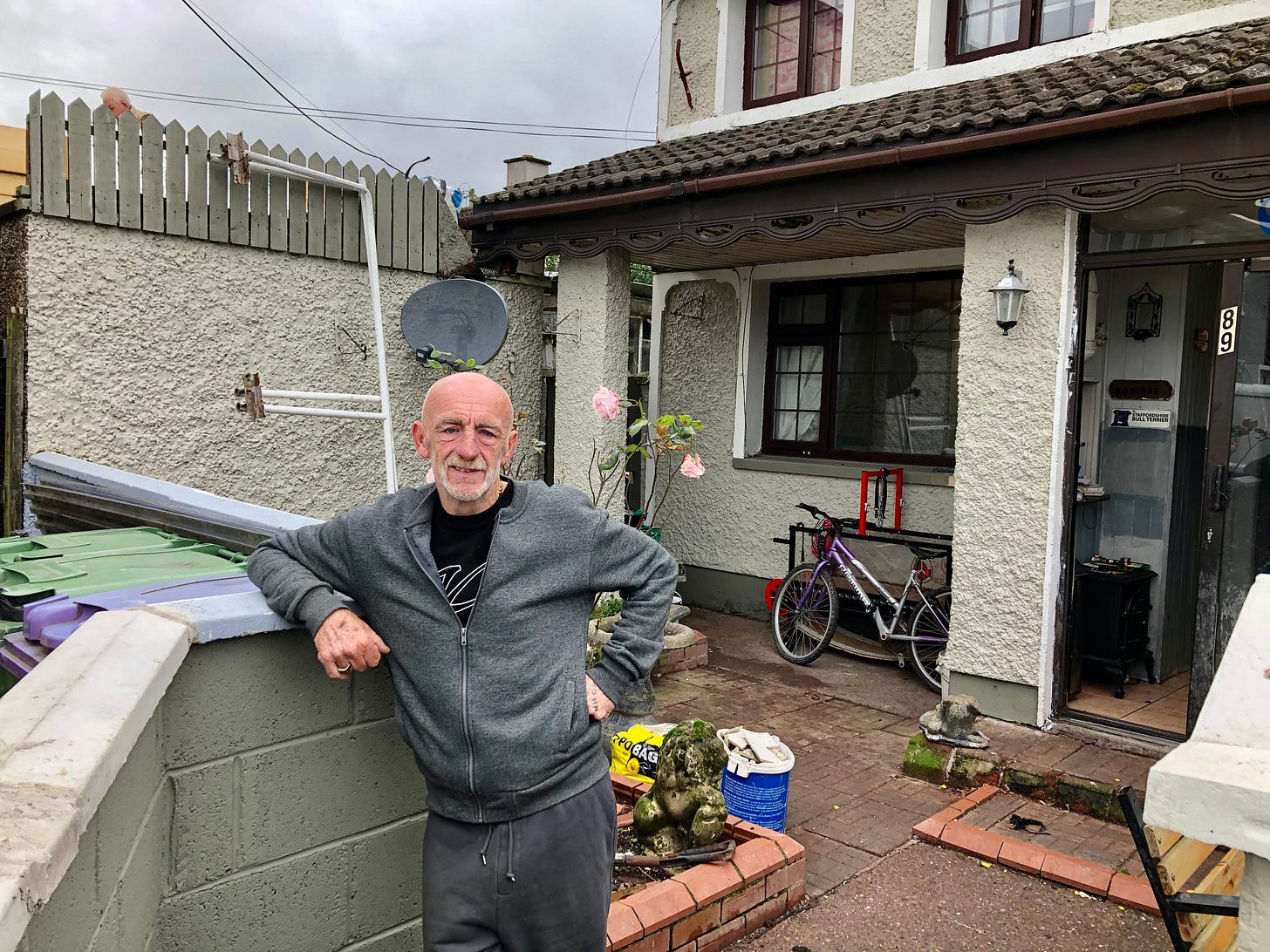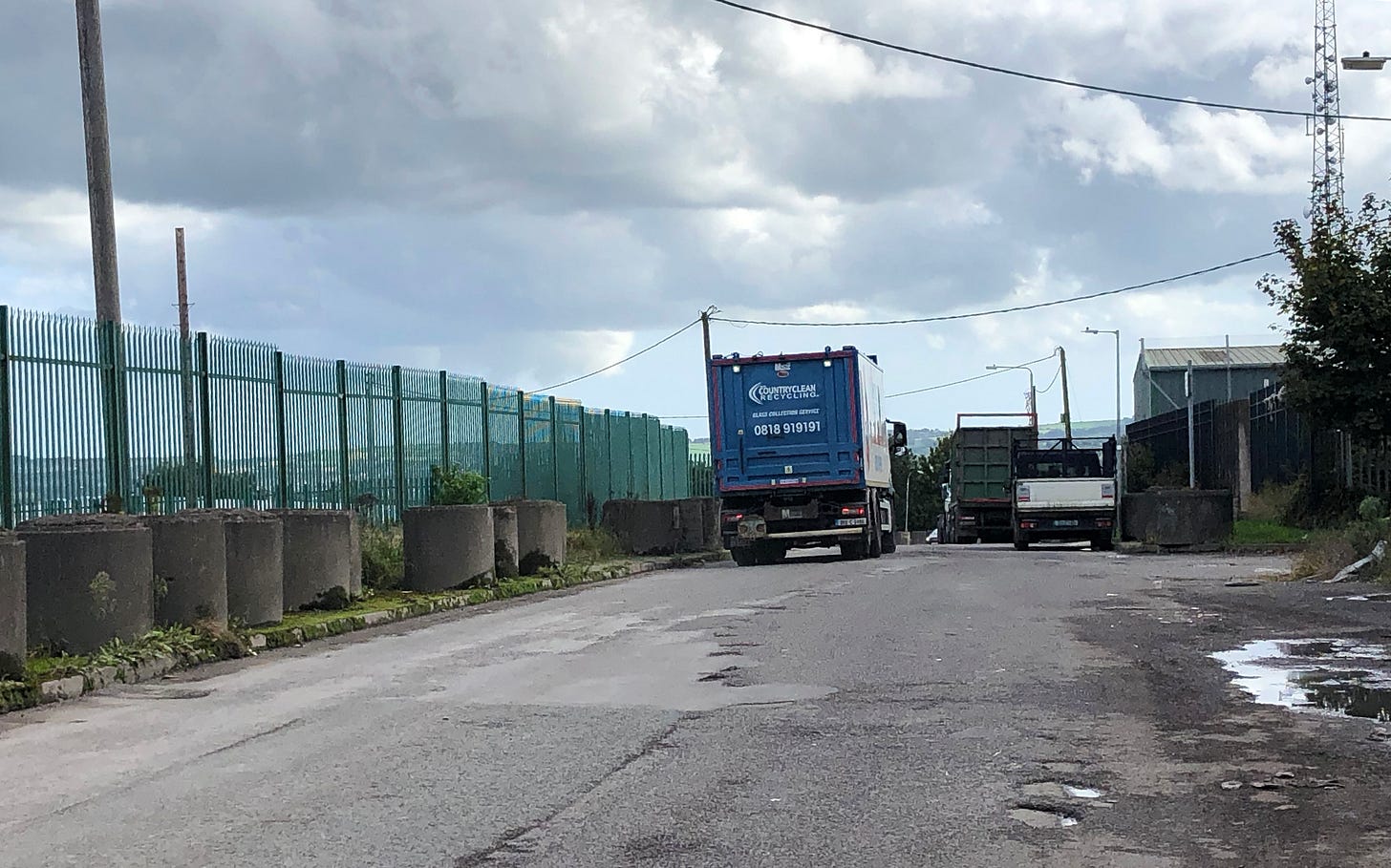After the fire: Churchfield waste facilities under the spotlight
More than eight months after a fire at a waste facility in the Northside, there are questions as to why one residential area carries the burden of so much of Cork city and county’s waste.
This article first appeared in the winter print edition of Tripe + Drisheen. It is a companion piece to our special report into what happens to Cork’s exported waste.
“I was just after coming back from walking my dogs,” John O’Flynn says, leaning on the gatepost at his home in Churchfield, where he has lived for 30 years.
On the evening of Friday April 9 this year, a large fire broke out at The National Recycling Centre, a scrap metal facility in Churchfield Industrial Estate.
It’s less than 500 metres as the crow flies from John’s house to the scene of the fire, and prevailing winds that springtime night brought billowing plumes of thick, dark smoke from the blaze directly over the quiet crescent where, today, John stands chatting with his neighbour.
It took twelve hours for 20 firemen with seven units of Cork Fire Brigades from Anglesea St, Ballyvolane and Ballincollig to battle the blaze overnight.
Cork City Fire Brigade released a statement urging residents of the nearby estates to close their windows and doors to avoid smoke from the blazing piles of scrap metal.
John recalls hearing this, but his neighbour, Jennifer O’Regan, busy evading being photographed, laughs when I ask her about the smoke: “Did they say that? Jesus, I don’t remember that,” she says.
National Recycling Centre had no fire inspections for five years
No Fire Inspection reports were conducted at the scrap metal yard where the blaze took place in the five years before the fire, according to Cork City Council’s Chief Fire Officer.
No-one from the EPA or Cork City Council monitored the emissions that were released into the local environment. Cork City Council’s Waste Enforcement officers attended to try to determine the cause of the incident.
There have been no prosecutions after the fire: Cork City Council’s press officer confirmed in an email that notice was served by their Waste Enforcement team to the operators of the site. A follow-up inspection took place on October 28: the National Recycling Centre was found to be “largely compliant” with the issues raised although there are “a few improvements to be made,” the press officer said.
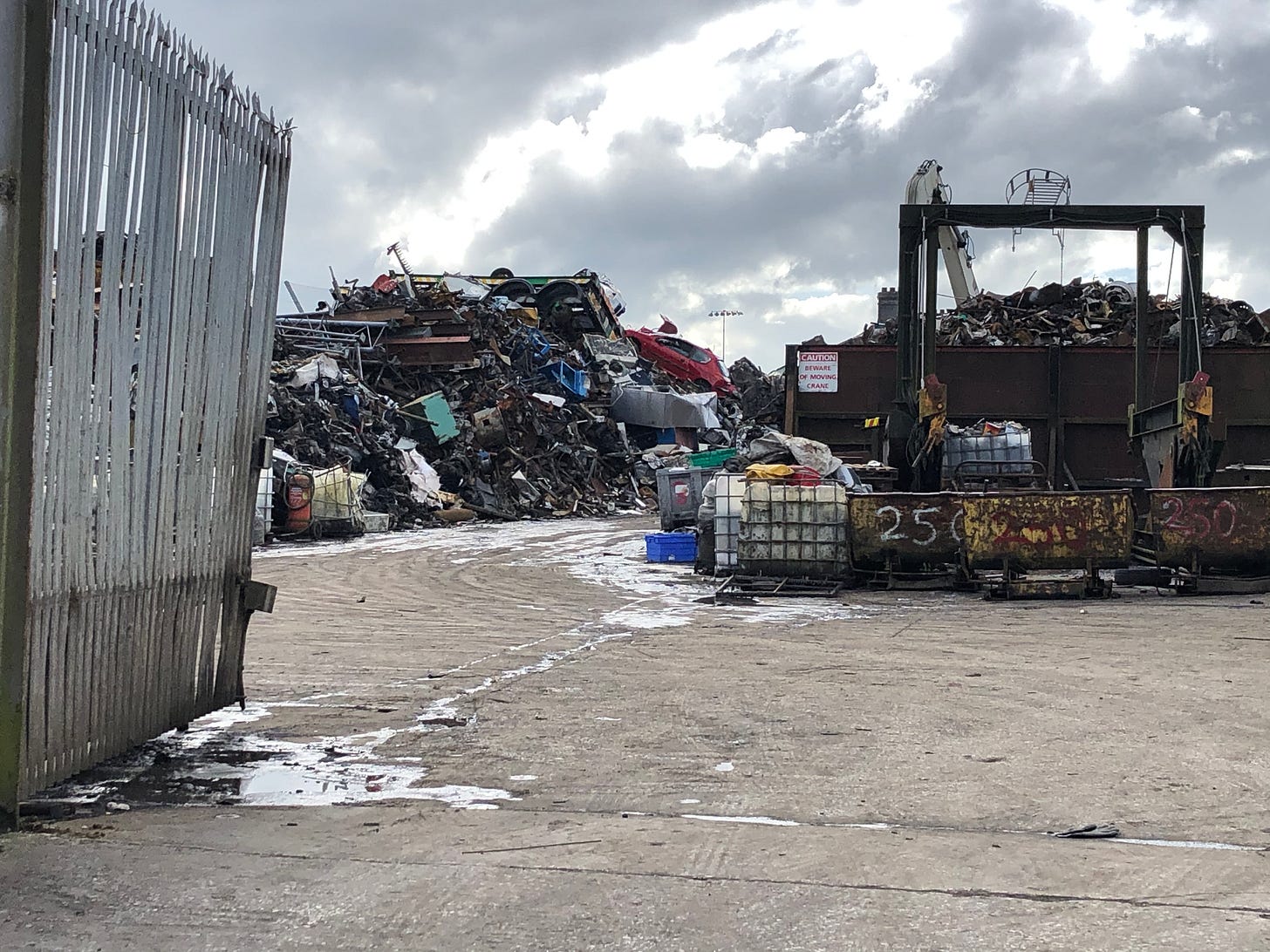
Is John surprised to hear that there have been no prosecutions, that no-one checked the emissions to see what the smoke Churchfield residents were exposed to contained?
He shrugs and smiles a smile of weary cynicism. “That’s the government, isn’t it?” he says.
John recalls hearing a series of loud bangs during the fire, which he thought were probably gas canisters. “I mean, there’s a load of other factories and things in there, so I suppose if more had gone up, it could have been much worse,” he says.
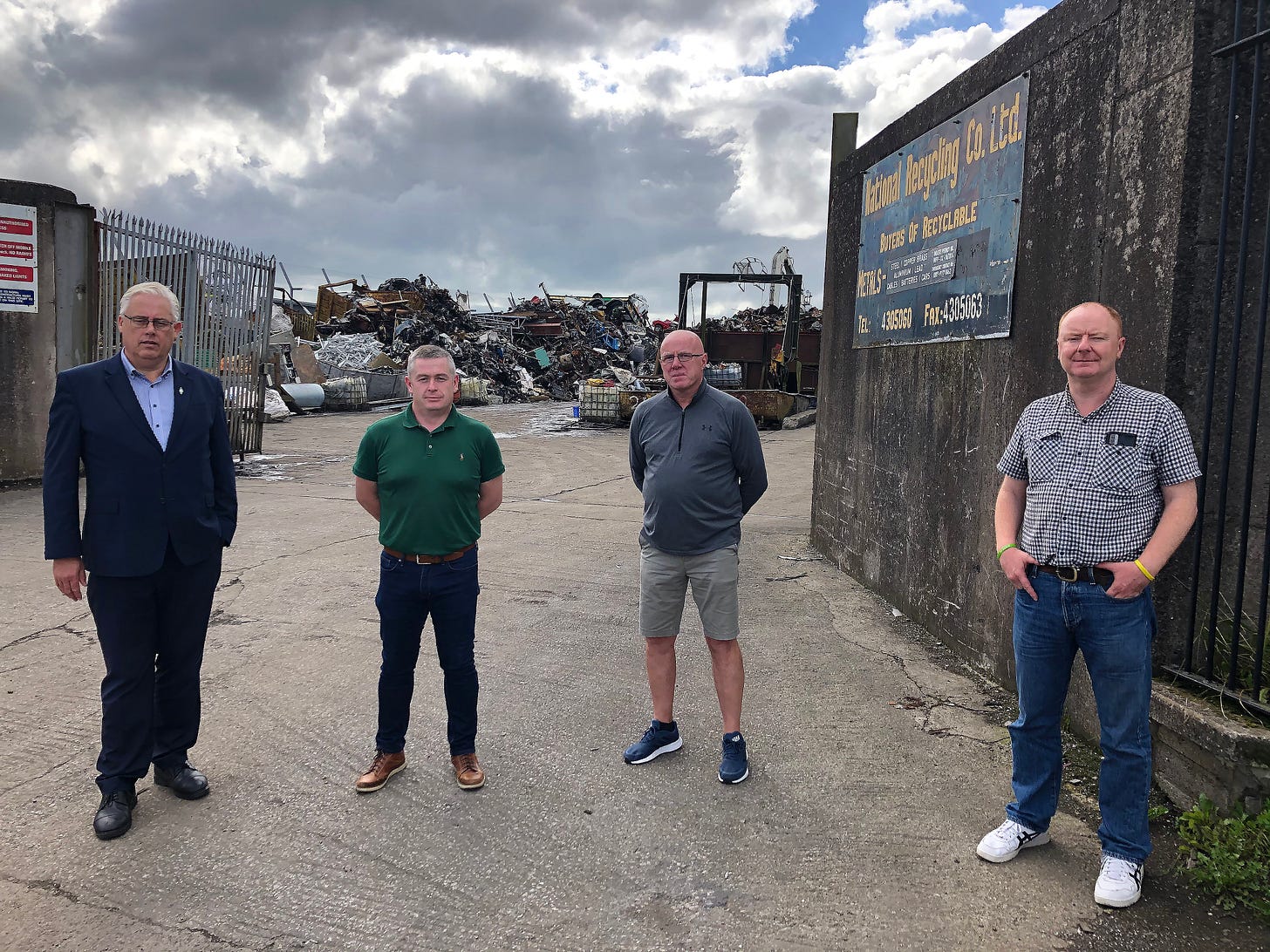
Three waste facilities
For local Sinn Féin councillors and TD Thomas Gould, the fire was an accident waiting to happen. For years, they’ve warned about various risks from the presence of a triumvirate of waste facilities that they say shouldn’t be located in their community at all.
As well as the scrap facility where the fire took place, Churchfield Industrial Estate is home to Ashgrove Recycling Ltd and Country Clean Recycling Unlimited; Country Clean is the wheelie bin service that bought Cork City Council’s public waste collection service in 2011.
Country Clean also own Cork Mini Skips. Several other services including Collins Waste Management, Kinsale and District Skip Company and MK Skips are listed with the same Churchfield Industrial Estate address. Country Clean owners David and Mary O’Regan are listed, on their most recent Annual B1 return, as directors of five other waste-related companies including one in the UK.
Country Clean now process almost 100,000 tonnes of domestic and building waste from Cork city and county and parts of Munster at their Churchfield facility each year.
The closest house, according to a recent planning file, is just 150 metres away.
On a blustery day, Thomas Gould and councillors Kenneth Collins and Mick Nugent meet me in the industrial estate. John F Connolly road, which cuts through the industrial estate, is a cul-de-sac that leads to Castleview Football Club, a much-treasured local sports facility where up to 450 children per week attend training.
St Vincent’s GAA Club, another busy Northside sporting amenity, is 300 metres away as the crow flies.
There are no footpaths on this heavily used road: to deter Traveller families from parking up, Cork City Council dragged sections of vast concrete pipe onto the footpaths years ago: pedestrians share the busy road with waste trucks and skip lorries.
“A thundering disgrace.”
Standing outside the National Recycling Centre, Thomas gestures at John F Connolly road’s pitted surface, the roar of lorries of waste coming and going.
“Look at the dirt and filth of it,” he says. “It’s a thundering disgrace. No-one with a disability can access the area, no-one with a buggy or a small child.”
“This is industrial stuff in the heart of a residential area,” he points out the estates visible in the distance: “Churchfield is there, Farranree is there, Fairhill is there. Hundreds of children come up here every day, and hundreds of houses are a couple of hundred metres away.”
To Thomas, Cork City Council’s willingness to situate the city’s waste facilities here is part of the ingrained multigenerational pattern of North-South socioeconomic divide in Cork.
“If they tried to put this by the pitches out in Douglas, there’d be a war,” he says. “The Northside has been neglected and abused for far too long. Over the years, licence by licence, Cork City Council have let Churchfield become the dumping ground for the city.”
“Our community has a lot of negative stigma and bad publicity. If you’re 12 or 13 and you’re being brought through here to go to your training, how does that reflect on how you feel about yourself? It’s outright discrimination against this community.”
Castleview FC: “dead rats on the pitch.”
Gerry Rennie from Castleview Football Club has come down to meet us. Castleview is a busy club with an illustrious history in Cork football, dating back to their heyday in the 1960s.
“We have 17 teams in the club and we have ten home games happening a week,” Gerry says. “We had 500 at a senior game the other night.”
He confirms the hazards of John F Connolly road as the club’s only thoroughfare and says the net impact of the road’s dangers is that most parents aren’t happy for kids to walk to training. Although children should be a short, safe walk from their club, parents with cars usually drive them to training and to matches, causing congestion in the club car park.
“There’d be 250 cars going up to a match. Then, because of how bad the road is, we have people complaining about damage to their suspension. Can you imagine when you have visiting teams coming from Waterford, Dublin, even other parts of the city? It’s embarrassing.”
Due to Castleview’s location, and, Gerry says, due to the poor lighting and general sense of neglect on John F Connolly road, the club has problems with anti-social behaviour: despite security fencing, sometimes they have to clear broken bottles off the pitches where children play.
When the National Recycling Centre blaze happened, Gerry and other club volunteers feared the worst: from the estates further down the hill, it appeared their beloved club was on fire.
“You could see the smoke from where I live, and you couldn’t tell if it was the club or not,” Gerry recalls. “We had to come straight up in case the club was damaged.”
Fire and road safety hazards aside, the proximity of three waste facilities within hundreds of metres of their pitches is off-putting: “It’s kids’ welfare we’re concerned about. We have parents saying they won’t bring their kids up because in the summer the smell gets bad. They say it’s a health hazard. We’ve found dead rats on the pitch.”
From public to private
A handful of local residents had ongoing issues with Country Clean for several years after the waste management company bought out Cork City Council’s domestic wheelie bin service in 2011.
EPA records reveal that Country Clean received 20 complaints about smells and noise in 2014 and 40 complaints in 2015. More recently, these have reduced, with 10 complaints in 2019 and 4 complaints in 2020.
For the local Sinn Féin representatives, the issue also stinks in an ideological sense: the party are against the privatisation of services like waste management.
There were already private operators like Greenstar and Country Clean on the scene when Cork City Council stopped its waste collection service, but over 12,000 Cork City Council waste customers were availing of waivers when Country Clean took over.
Sinn Féin and a handful of other local representatives argued that fly-tipping would increase because there are many households that can’t afford annual wheelie bin charges.
“Cork City Council’s waste collection service was for pensioners, people on disability, social welfare,” Thomas says. “It was aimed at people who needed the service and struggled to pay.”
Licensing puzzle
All waste facilities need licensing, but those handling under a certain tonnage don’t have to have a licence from the Environmental Protection Agency (EPA).
The National Recycling Centre where April’s fire took place has a local authority waste facility permit to handle 10,700 tonnes of scrapped vehicles per year from Cork City Council. This is why the follow-up enforcement visits after the fire were conducted by Cork City Council and not the EPA.
Ashgrove Recycling and Country Clean both have EPA licences. Ashgrove Recycling have been licenced to handle 50,000 tonnes of waste per year in Churchfield Industrial Estate since 2002.
But there is a curious gap in licensing when it comes to Country Clean. The company applied for an EPA waste licence in February 2009 because they were exceeding the quantity of waste allowed by their local authority permit, according to Cork City Council’s Environment Department. In 2010, their Cork City Council waste facility permit expired.
Country Clean took over Cork City Council’s waste management operation in 2011, but they weren’t granted their EPA waste licence, to handle up to 100,000 tonnes of waste, until January 2014.
“Country Clean took over the waste collection without an active licence,” Cllr Kenneth Collins says. “If there was a tendering process, and if I was another company who applied, I’d have serious questions about that.”
Tim Lucey, now CEO of Cork County Council, was Cork City Manager at the time that Country Clean acquired Cork City Council’s waste management operation. I contacted Mr Lucey’s office asking if he’d be willing to discuss why Country Clean were granted the waste tender despite their lack of EPA licence. A press representative of Cork County Council told me it would be “inappropriate for Mr Lucey to comment.”
“Country Clean Recycling made an application to the EPA for a Waste Licence in February 2009,” Cork City Council’s Environment Department confirmed to me in an email.
“Until such time as the EPA had decided on the application for a waste licence, the permit conditions set out by Cork City Council’s waste facility permit remained in force. The permit issued by Cork City Council for this facility in Churchfield expired in June 2010. The EPA had still not made a decision on the application at that stage, but they confirmed that until such a decision was made, the facility would continue to operate under the permit issued by Cork City Council.”
In the first year of EPA licensing, Country Clean processed 98,113 tonnes of waste, just below their licencing limit of 100,000, according to their Annual Environmental Report on the EPA website. According to Cork City Council’s own email, they were already exceeding the volumes of their permit conditions by 2008, even before they took on Cork City Council’s wheelie bin customers.
Fire risk breaches
A month before the National Recycling Centre fire, both other waste facilities in Churchfield Industrial Estate were found to be non-compliant during fire risk audits conducted by the EPA.
Country Clean Recycling were audited for fire risk by the EPA in 2018, when non-compliances including blocked fire exits and no fire detection system in one building were noted, and March 2021, when a “minor non-compliance” was noted.
Ashgrove Recycling wasn’t audited in 2018, but was non-compliant in March 2021, with the EPA noting dust build-up, difficulty accessing fire extinguishers and a failure to implement recommendations of a Fire Risk Assessment.
After April’s fire, Thomas Gould, Kenneth Collins and Mick Nugent asked for a meeting with the EPA’s Office of Environmental Enforcement (OEE) to find out what enforcement actions were being taken.
The OEE noted previous prosecutions of both Ashgrove and Country Clean for breaches of their waste licences. There were no enforcement actions taken as a result of the fire inspections.
The EPA was keen to note that, despite Ashgrove Recycling’s €45,000 fine for licence breaches this October, the issue was a historical one dating back to 2017 and that both facilities are largely compliant and work with the EPA to fulfil licensing requirements and remedy fire risk audit issues.
Country Clean disputes
Just one year after the EPA first granted Country Clean their waste licence, they prosecuted them for breaching it.
In January 2015, the company was convicted on six charges relating to the handling and proper storage of waste. Judge Olann Kelleher imposed a fine of €12,000 and awarded costs of €9,545 to the EPA.
The EPA says Country Clean have been “largely compliant” since, but when Country Clean applied for planning permission to expand their Churchfield operations with a proposed “bring site” for recyclablesin 2016, under the name “Greener Families,” some members of the local community staged protests, seemingly based on their previous experience.
“We had protests up there because we’d had problems with the smells, the rats,” Cllr Kenneth Collins says. “The rats were the size of cats, the flies in the summer were unbelievable.”
Country Clean has made other unsuccessful planning applications to expand their operations, both in Churchfield and in Little Island, since.
It’s a dirty job but somebody’s got to do it
Waste management is a dirty, necessary business. Nobody wants to live near waste facilities, but they have to be located somewhere.
In Country Clean’s planning applications, reference is made to the growing volume of waste that goes hand in hand with a growing population; under the government’s Ireland 2040 plan, Cork city is due to double in size in under two decades. Where are the long-term plans to deal with the additional waste requirements this will bring?
Although there is an enormous amount that could be achieved by the first two of the three “Rs” of Reduce, Reuse and Recycle, any population growth will involve an increase in the amount of waste we’re producing.
In the second part of this special report, I’ll be writing about the amount of our domestic waste that’s actually being recycled.
Figures from Country Clean’s Annual Environmental Reports, openly available on the EPA website, show that two thirds of the waste the company accepts each year isn’t being recycled, but is being sent for incineration or landfill.
I wanted to interview someone from Country Clean: their most recent planning application for a materials sorting facility in Little Island has been rejected, but is this necessary infrastructure if waste is going to be properly sorted for recycling?
There are many challenges in waste management and a known bugbear for the waste industry is the well-documented issue of contamination of household recycling: if materials are wet or soiled, they will end up as mixed municipal waste and won’t stand a chance of being recycled.
No-one from Country Clean was available for an interview in the two weeks that I emailed and called. A list of questions I forwarded as a last resort went unanswered by the time of going to print. If we do receive future updates, they’ll be published on the Tripe + Drisheen website.
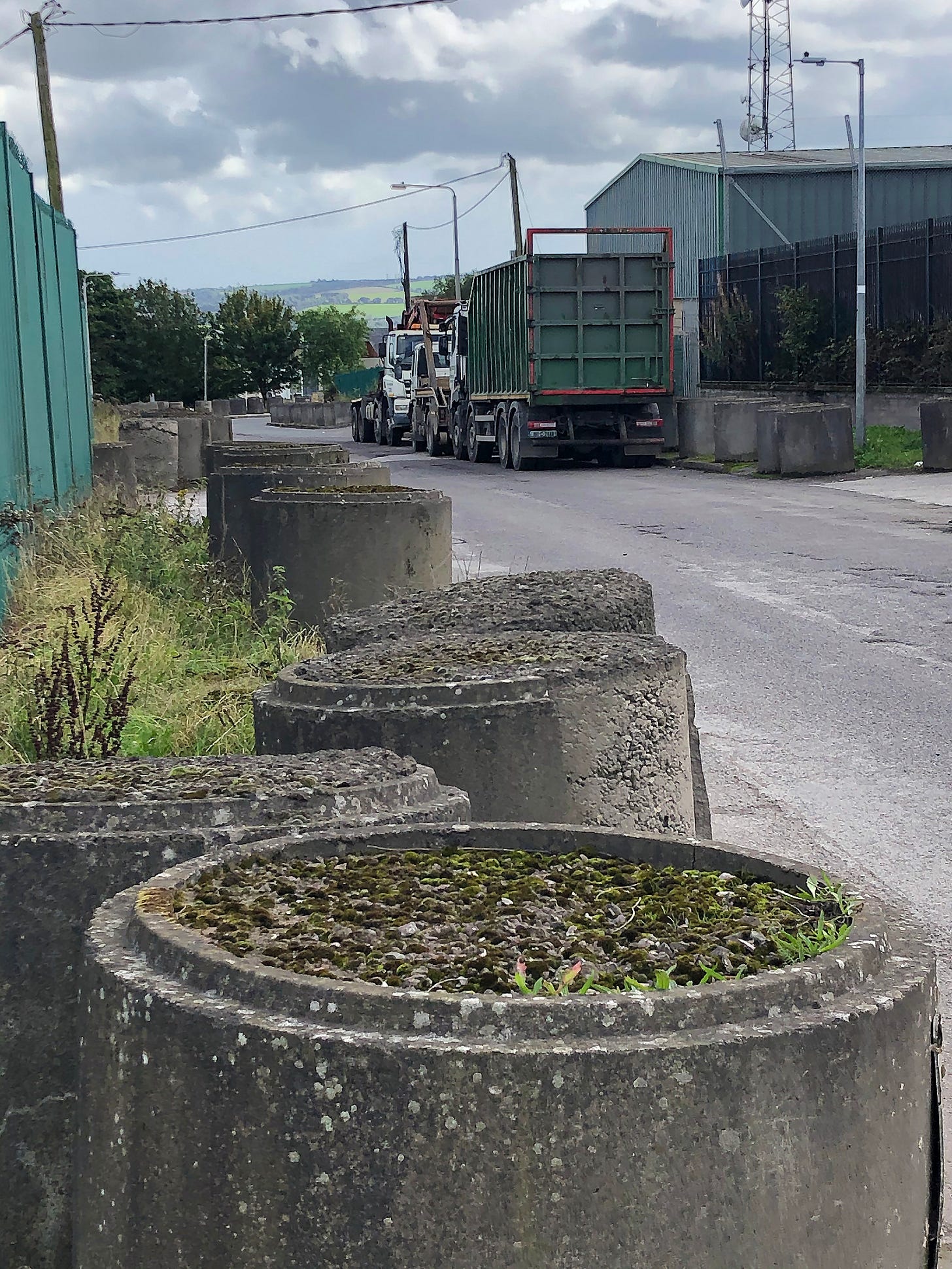
Bottlehill
In the short-term, Thomas Gould wants to see improved lighting and road surface and restored footpaths on John F Connolly road, alongside a more robust approach to enforcement taken by both the EPA and Cork City Council.
In the longer term, he doesn’t want Churchfield to be the repository of Cork’s waste at all.
He says there’s a viable site lying unused just 20km away, in an area of much lower population density, in Cork County Council’s local authority area.
Bottlehill was first granted planning permission as a landfill “superdump” in 2004. The 250-acre site has a licence to landfill five million tonnes of waste over 20 years and was due to open in 2010, before Cork County Council deemed it “economically unviable” because of new EU levies on landfill.
The €54 million North Cork development never opened. It sits empty to this day.
“The waste services should be moved out to Bottlehill, where huge money was spent to make it into a facility,” Thomas says. “The whole thing is a scandal. We’ve people who can’t be housed, people living on the streets, and we’ve spent €54 million on Bottlehill and it’s sitting empty? There should be a public inquiry into it.”
County Councillors voted down a plan to lease some of the Bottlehill site to an energy company for 22 wind turbines in February 2020; since then, it’s been proposed as a site for “recycling” building waste, but nothing has happened.
While North Cork locals who formed the Bottlehill Environmental Alliance to oppose the superdump may not agree with Thomas, the Bottlehill site is certainly in an area of far lower population density than Churchfield. And a change of use from landfill to waste transfer and separation is not such a giant leap.
I emailed Cork County Council’s press office to ask for an update on Bottlehill. After a two-week delay, I received the following answer: “Cork County Council continues to monitor demand for landfill capacity. There are no current plans to advance alternative uses of the site.”
For Thomas Gould and the Sinn Féin councillors, and for some Churchfield residents living within hundreds of metres of where almost 150,000 tonnes of waste is processed by three facilities each year, as the city grows and its waste needs with it, there is going to have to be a longer term solution sooner or later, be that at Bottlehill or elsewhere.
As far as Thomas is concerned, the fire in April serves as a clear warning of this.
“There was a serious fire up here and we haven’t gotten to the bottom of it,” he says. “We don’t have any reports as to what was released here, if there were dangerous substances in the smoke. This was a major fire: no published reports and no prosecutions. We want to ensure it never happens again. This place could go up again, only next time much worse, and who’s responsible?”




